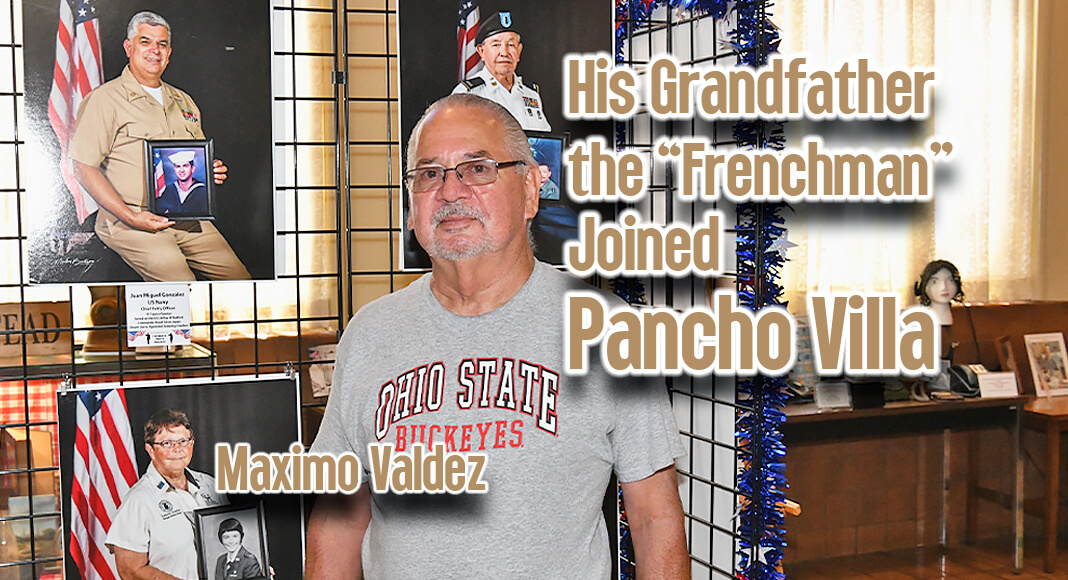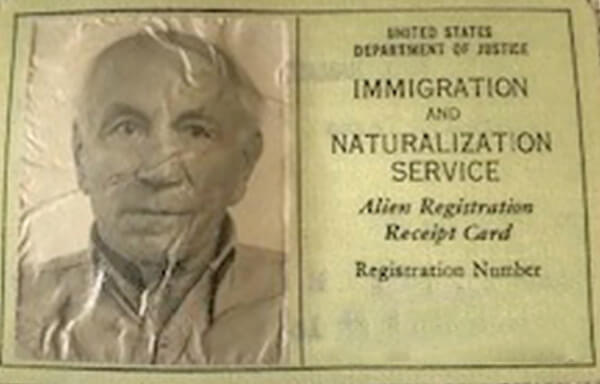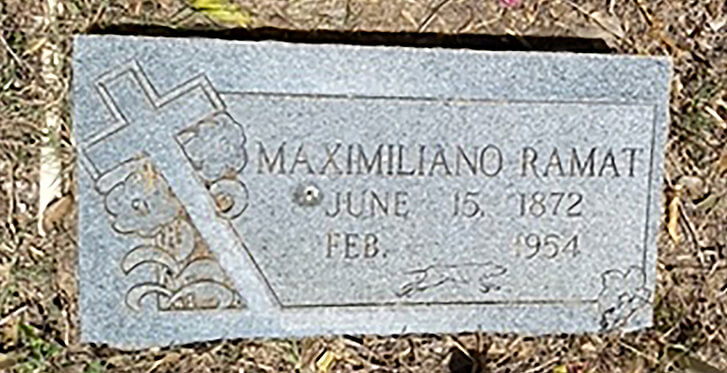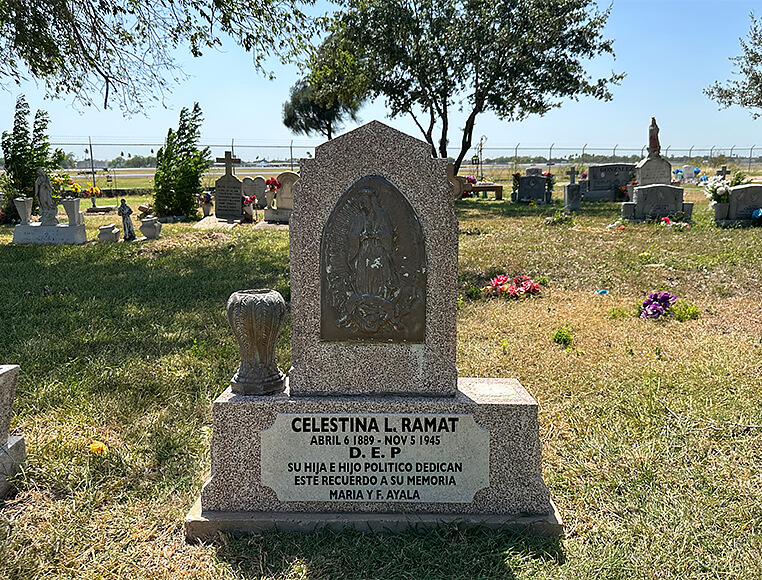
Texas Border Business
By Roberto Hugo González
This narrative originated on July 21, 2023, during Mr. Maximo Valdez’s visit to the McAllen Heritage Center, Museum of History & Culture, located on Main Street. Dr. Nedra Kinerk , the museum’s co-founder, was hosting visitors from out of state. They brought a brochure featuring the La Piedad cemetery, briefly mentioning Valdez’s grandfather, Maximiliano Ramat. Dr. Kinerk introduced the family to me and graciously asked if they could be interviewed for a subsequent article about Mr. Valdez’s grandfather and his role in the Pancho Villa revolution. Elva Cerda, also a co-founder and the museum’s director was thrill witnessing how visitors from out state find the museum interesting.
The armed forces have been an enduring symbol of honor, courage, and resilience throughout history. These values, which shape the lives of soldiers and echo in their families’ stories, are emotionally illustrated in the journey of Maximo Valdez, a former Navy serviceman and a descendant of a French soldier, Maximiliano Ramat, who once served with General Pancho Villa during the Mexican Revolution, 1910-1920.
Born in 1949 in McAllen, Texas, Maximo Valdez carries a rich family history and a strong spirit inherited from his predecessors. Maximiliano Ramat, his French grandfather, migrated to America via South America and was later captured by the Mexican revolutionary Pancho Villa. Recognizing Ramat’s medical expertise, Villa designated him as a veterinarian for his horses, leveraging his medical expertise to maintain the vitality of his cavalry.
Maximo’s journey mirrors his grandfather’s courage and adaptability. Maximo enlisted in the Navy at age 20, 1969, and served as a mine sweeper during the Vietnam War to safeguard his fellow service members and the nation.

Simultaneously, Maximo’s narrative interweaves with his home city, McAllen, Texas. McAllen, a border city with Mexico, served as a refuge for Maximiliano Ramat after the Mexican Revolution, where he continued his veterinary practice. Maximo was raised in this city, in the same house his grandfather lived, embracing the same values of kindness and compassion his grandfather showed towards those in need.
This family legacy continued to influence the trajectory of Maximo’s life even after his military service. Following his service in the Navy, Maximo moved back to Illinois, working as a factory worker and a carpenter and eventually securing a career in the nuclear industry. He retired and decided to launch his truck accessory business, which he ran successfully for over two decades.
Maximo’s career is characterized by determination and industriousness, while his personal life bears the imprints of love and loss. He was united in matrimony with Laura Michelle Schellenberg Valdez, a woman of German-American descent renowned for her exceptional talent in quilt-making. Laura departed this world in February 2023, but her legacy endures, woven into the fabric of hundreds of quilts that have found homes in families across the United States, symbolizing love and compassion.
Despite enduring hardships and grief, Maximo’s spirit remains undeterred. His visit to his dear friend Gilberto Escobar, suffering from a critical health condition, proves Maximo’s enduring sense of friendship and empathy. Their friendship, rooted in shared experiences in the nuclear industry, transcends the variations of life, underlining the strength and depth of their bond.
He told Texas Border Business, “The real motive behind my visit was personal and overloaded with emotion. I traveled there to visit a man whom I hold as a dear friend who has been like a brother over the years, Gilberto Escobar.
Gilberto and I met in 1980 at the LaSalle County Nuclear Generating Station in Illinois. We quickly became good friends, more than just regular work buddies. Our friendship was so strong that I thought of him as a family – like a brother, even though we weren’t blood-related.
Unfortunately, fate had some testing times for his dear friend Gilberto. His health hit severely when doctors discovered cancer in his stomach, leading to a surgical procedure that cost him his intestines. The surgery took place in April, and ever since, the intensive care unit of a hospital in Edinburg has been his home. His battle with health has been rough. He slipped away twice but was miraculously revived each time, demonstrating his tenacity and determination.
Complicating his recovery was a vicious virus that attacked his skin, devastating the protective layer over his stomach. Doctors had no choice but to graft skin from his right leg to cover the open wound on his stomach. His condition remains critical, and he still grapples with an open wound across his abdomen.
However, amid these tumultuous times, there is a silver lining – Gilberto regained his ability to talk. Following rigorous therapy sessions, he could communicate, although his physical movement remains restricted.
When asked if Gilberto was happy to see him, the question touched a raw nerve. “Our reunion was emotionally charged. As I entered his hospital room, tears welled in our eyes as we held onto this shared moment. For Gilberto, my visit reminded me of our enduring bond and his determination to fight. Gilberto passed away weeks later.
Valdez, the grandson of the French soldier Maximiliano Ramat, symbolizes a family’s legacy of generosity and humanitarianism. In an exclusive interview, Valdez reflected on his relationship with his grandfather, their shared home in McAllen, Texas, and Ramat’s significant impact on their family and the community.
Valdez’s last memory of his grandfather was when he was just five years old when many of us still struggle to fully understand the concept of life and death. Yet, he distinctly recalls standing by his grandfather’s casket, curiously touching his nose. This final emotional memory marks the end of his interaction with Ramat but certainly not the end of his influence.
Maximiliano Ramat resided on South Ware Rd in McAllen until his death. Notably, he was not alone in his residence, as his family, including his grandson Maximo, lived with him. But their home was not just a dwelling for their family but a refuge for those in desperate need.

Ramat, being the benevolent figure he was, routinely helped individuals who crossed the border in search of a better life. He provided them with food, shelter, and guidance, showcasing an unyielding empathy that made their transition more manageable. His selfless acts of kindness did not go unnoticed or unreplicated; his daughter, Marta Consuelo Ramat, and Maximo’s mother continued this tradition of welcoming strangers in need into their homes.
Marta, according to Valdez, inherited these noble values from her father. Just like Ramat, she opened her doors to the needy, offering comfort and assistance to those struggling with their circumstances. Marta carried the torch of her father’s humanitarianism, reflecting Ramat’s profound impact on her life.
In this candid conversation with Mr. Valdez, he opened up about his family’s decision to leave their home in McAllen, Texas, and start anew in Illinois. He recalled how their family was going through a financially trying time, teetering on the brink of desperation.

His mother, the family’s matriarch, used to work as a maid for a family known as the Bensons. In addition to her work with the Bensons, she performed odd jobs to keep the family afloat. However, the harsh reality of their financial situation eventually led to the decision to shape the family’s life forever.
It was a tough call, yet necessary. The Valdez family decided to migrate to Illinois, seeking a fresh start in a state known for its abundant crops and fertile farmland. They planned to build a new life around agriculture, leveraging their skills and strengths.
The journey was not without its challenges, however. The family had a falling out with the truck driver who had brought them to Illinois. Despite this, Mr. Valdez’s mother decided to stay, a choice motivated by the fact that their father had abandoned them when Mr. Valdez was just two years old.
Their mother found herself raising six children single-handedly in a new state without the support of their father. It wasn’t very comforting, yet she bravely faced the challenge. She was a woman of strength during the most difficult times. She had a heart that was large enough to embrace not just her children but the enormity of the trials that came with the territory of being a single mother in a new land.
Despite their difficult beginnings, the Valdez family pressed on. Their journey from McAllen to Illinois was a geographical transition and a leap of faith into a future that promised a better life.
Unfortunately, Marta has since passed away, her death taking place in Joliet, Illinois, years after the demise of Ramat. Yet, her compassion and the values she inherited from her father live on through her son, Maximo Valdez.
Valdez’s life, in many ways, has been shaped by the legacy left behind by his grandfather and mother. From a young age, he witnessed first-hand the power of compassion and humanity, leaving an indelible imprint on his character.
Maximo Valdez’s story demonstrates how a family’s legacy of kindness can be passed down through generations, influencing lives in ways that transcend time and place. It’s a potent reminder that our actions today can shape the people and world of tomorrow.
As the interview wrapped up, the depth of Mr. Valdez’s story resonated profoundly. His family history – a rich narrative intertwined with the complex histories of nations, revolutions, wars, and migration – echoed in the room long after his departure. Through his words, Maximiliano Ramat’s legacy, an inspiring saga of resilience, tenacity, courage, and compassion, continues echoing through generations. This story, so intimately tied to the life of Maximo Valdez, remains alive, pulsing with vitality and relevance, a living tribute to the enduring spirit of humanity.














